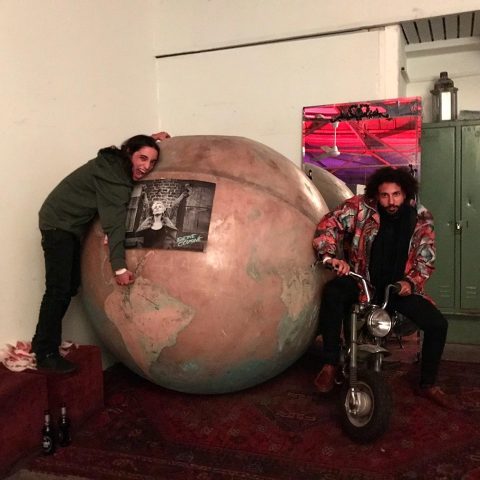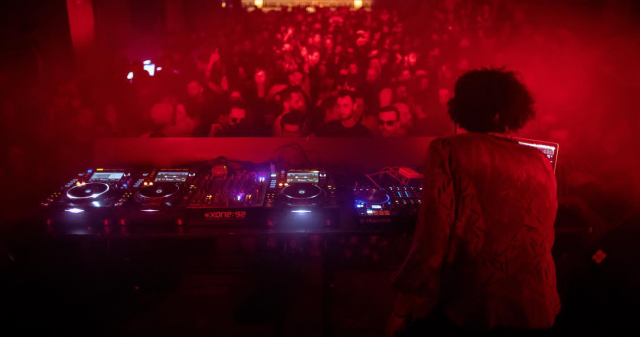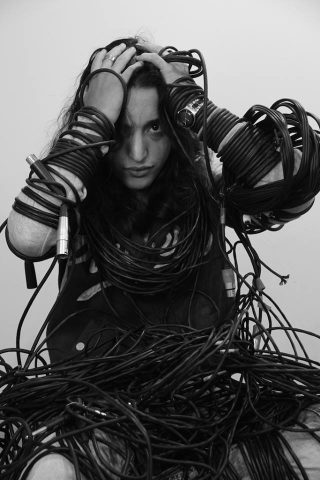“Everything is always late and past its due date. I am Arab after all, there’s no escape from that” – Sama’
Starting on that note, I met up with Sama’ and Dar the afternoon before their gig at The Ballroom Blitz. Sitting in a café in Badaro, with the noises of the city fighting for attention in-between laughs, and the smell of hot chocolate tingling our noses, the topics of conversation were as versatile as the two DJs’ personalities.
Sama’ is a Palestinian DJ who’s been making Techno music inspired by organic sounds for a few years now. Her name is not strange to regional and international electronic music lovers as she has made headlines around the globe. She was featured on the Boiler Room documentary on the Palestinian music scene, talking about what it means to be a DJ in Palestine and walking us through the party they were planning.
Dar started as a bedroom DJ, mainly playing at house parties. The restrictions of the Palestinian scene made it hard for him to get gigs and play more parties, which is why he got on board with Sama’ when she suggested to start a union to help the scene grow. That’s how Union Naqaba was born! It allowed them to make things more organized and structured and they started planning their own invite-only parties. Dar is also a social entrepreneur, working on encouraging and helping Palestinian entrepreneurs grow their business and find the resources they need via Build Palestine.
Get to know Sama’ and Dar in this intimate yet fun interview!

Sama’ and Dar
You’ve performed in different countries, some being in the MENA region and others in various parts of the world. If you had the chance to become a resident DJ at a club of your choice, anywhere in the world, which one would you pick and why?
Sama’: We were actually talking about this today and I was saying that I would really like to become a resident here in Beirut. I love Beirut… For me, it’s the #1 party place and it has higher standards than Berlin. I respect it a lot. It’s where I started and where I got into techno so it means a lot to me. The last gig I had here meant so much to me…. At some point, there was this dilemma where me and my friends were standing behind the deck and we looked at each other like “How are we on this side? We’re usually on that side, jumping around and dancing!” I don’t know… I have this weird connection with Beirut.
But I don’t know which club I would choose… I used to love B018; that’s literally where I used to be every weekend. I’m sad it changed now, no more techno. I would have loved to play there.
Dar: I was telling Sama that I wanna be a resident in Palestine.
Sama’: I told him we should come to Beirut for like 2 months and be residents here and he was like “What about home?”
Dar: I mean, I want my residency to be in Palestine. I am, in some way, a resident of that scene.
Sama’, Can you tell us about awyav; how was the idea born and how it evolved since its launch in 2017?
Sama’: It was launched way before 2017 but it wasn’t a publishing house. It was a licensing library for film. I used to work as a sound designer for film in Egypt and at some point I started working as a music supervisor: choosing music, getting licenses, putting them in the right place, etc.
Awyav has an interactive platform so I started using it as a designer. With time, they offered me the chance to run it. There was a phase where I was going to France a lot so I started discovering that royalties are real – they’re not fiction – and that people get royalties for playing. That’s when I was like “Hey! Guys, we’re missing out on a lot!” And that’s when we decided to turn it into a publishing house.
We have a lot of problems here in the Arab world, especially in Palestine. If you want to record there, you have to do it with Acom which is in Israel – nobody wants to do that. I’d never go there. As for Egypt, you have to go through censorship. In Lebanon, you can do it but it’s hard to get your rights. What we started doing is registering artists abroad and having our representatives there collect our rights/royalties from here. Plus work with governments and NGOs on creating this law and implementing it.
![]()
I mean… I’ve never been to Tel Aviv.
You were featured on the short Boiler Room documentary about the underground scene in Palestine. Is there something that was left out of it that is worth mentioning? What was the highlight of that experience?
Sama’: I think it covered everything. At the end of the day, there are a lot of DJs so you cannot feature everyone. They were also restricted time-wise since they only had 20 mins. They had to cut a lot of stuff. The experience itself was amazing, I never really believed that they were gonna make us stand for Palestine until the movie was out. Nobody does that! It’s scary… Plus, they got harassed a lot… when they were leaving Palestine, all their equipment was taken by Israelis for 2 weeks and they sent it back to them to London after going through everything… It was a daring step to take but I’m glad we did it because it helped the scene move to the next level and the way people look at us changed, which is very nice.
The party… I mean Fridays are not for parties, at all. The whole thing was not supposed to happen. We were all on a huge adrenaline rush and it shows in the video from the way people were dancing cause they knew that the party could stop at any moment. The people were amazing! That was the biggest turnout we had. We all knew each other, it was like this big family party and we were all happy and cozy even though there were cameras everywhere.
Dar: it’s a milestone for the scene itself. It’s like the bar was set high that day. Everyone around us, the DJs, they’re all looking at us with a more serious matter.
Sama’: I mean we got 20 Germans flying in to Ramallah on New Years to party with us. We met them at the party and they were like “yeah we heard that you were playing so we flew in from Berlin”.
I mean this could be huge, especially for Palestine which nobody visits cause it’s a war zone. We’re literally 30 mins from Tel Aviv which is THE city for partying. Everyone I meet in Europe is like “yeah I’ve been to Tel Aviv once, I know where you’re from”. I mean… I’ve never been to Tel Aviv. And whenever I ask them if they crossed the wall, they say no cause they’re scared and I encourage them to do it. But now, a lot of people who go there call me asking for recommendations cause they wanna party and they love it so much that they stay there for months.
Dar: It’s also being part of an international community, right? That’s what we’re trying to do with union. We don’t necessarily have to be musicians and DJs. we have artists, painters, etc.
Sama’, you’re from Ramallah, you studied in London, you started your career in Cairo and then you settled in Paris. How did moving from each of these countries to the other affect your music?
Sama’: Actually, each one added something to my music. In Lebanon, I discovered techno. In Cairo, I learned it properly. In London, I started experimenting with it more and diving into it. That’s when I started focusing more… that’s when I became human.
In Cairo, that’s when raw sounds started coming into play. In every song I made, there’s at least one really random sound from reality. Sound design and working in film really changed the way I see and listen to things. I have a track I made from the sounds of the war in Gaza. I really like the sounds of nature and I play it a lot in my live sets.
Who’s one artist, dead or alive, with whom you would like to collaborate?
Sama’: For me it would be Stephan Bodzin or Max Cooper. It would be a dream to work with one of these two. Just watching them work would be enough, actually.
Last time I saw Bodzin in Beirut, maybe 5 or 6 years ago, I annoyed the shit out of him. I stood next to him in the DJ booth and I was like “What is that? What are you doing? What does that do?”
I was living in Cairo, my friend called me and was like “We’re getting Bodzin”. DONE. I booked my ticket and came just to watch him and then I left.
Dar: I’ve been a fan of Green Velvet for years. He’s an old school guy, I really like him.
Sama’: yeah, I think if you two met you’d really get along.
![]()
When I heard electronic music for the 1st time, I felt completely disconnected from the world.
If you had not chosen music production as a career, what do you think your life would look like now?
Sama’: I would’ve been a sports manager. I would be doing something football-related somewhere, that’s for sure. I wanted to do sports management but my parents didn’t let me. They sent me to AUB because my mom loves the university. Then my dad was like “don’t you love sound stuff?” he took me to a university and as soon as I saw the 1st studio I was like “enroll me now”. And that’s how it all started.
What is it about electronic music that appeals to you? What do you like about it that you can’t find in other music genres?
Sama’: For me, it’s because of the space it creates. When I heard electronic music for the 1st time, I felt completely disconnected from the world. That’s what got me attracted to it. I wanted to share the feeling it made me feel with my friends. I still listen to a lot of different genres but playing-wise and sharing-wise, techno all the way.
Dar: It’s that universal feeling of having a safe space that electronic music creates. There are no borders for electronic music. It’s like Sama’ always says: “it’s the orchestra of electronic music because of all the layers”.

Dar at The Ballroom Blitz
How do you use your music as a tool of activism? Do you have a special memory of that happening that you would like to share with us?
Sama’: I honestly never wanted to be political or anything close to that… but I guess my existence itself – being a Palestinian woman – is an act of (unplanned) activism on its own.
Dar: It’s not about activism for us, it’s about living. Living normally, doing what we wanna do, creating alternatives… it doesn’t have to have the heaviness of activism. It’s a daily thing for us.
On a more personal level, what does your typical Sunday look like? Is it also all about music?
Sama’: Sunday in Ramallah is like Monday here. The problem is that I still cannot find my weekend. When is my off day? Still not getting there but on the way. Usually Sunday for me when I’m on tour is when I go back home – wherever home is at the time. It’s the day when I sleep, eat, watch series and be lazy.
Dar: I’m usually giving workshops on Sunday. But working those two hats (social entrepreneur and DJ) makes it hard for you to have days off cause even the celebrations are work. Working in the nightlife is having so many things mixed up, and having little to no days off. The only time I feel I have off is when I’m traveling.
What’s one non-music-related fun fact that very few people know?
Sama’: We read. A lot (laughs)
Dar: I think that’s a fun fact because we’d be reading something and then start discussing it for hours without even noticing. Her dad owns a publication firm and he has so much knowledge to give and I think it’s always interesting to talk about these things.
Sama’: We’re always talking politics or books and discussing conspiracy theories and making up theories about books… it’s fun.
Now getting more personal with Sama’:
On Mobilee Records:
I signed a deal with Ben Turner, Richie Hawtin’s manager I finally have a manager so I’m very excited. Maybe in a month I’ll be able to start replying to all my emails (laugh).
Mobilee Records is a huge and pretty old label from Berlin. I’ve been listening to them for a really long time. I’ve been working on my EP for a while now and it’s almost done so I sent it over to the label and they replied and that was shocking! I went over to their studios and we worked on one of the tracks and now we’re finalizing everything and getting remixes done.
Hopefully we’ll be releasing next month. I always stay hopeful cause things are always late. I am Arab after all so I can’t really run away from that (laughs)
On Union Naqaba:
I wanted to throw a festival but I wasn’t in Palestine so I called my boys over there and I suggested that we start a collective for all the old and new DJs who wanna play with us. There’s a bunch of collectives in Palestine and it’s really hard to find a gig if you’re not part of one of them so I just wanted to also collect everyone who’s not in collective so they have the opportunity to play as part of a collective. I had been talking to people abroad about it and I knew I could get international artists but one thing’s for sure: I cannot reply to my email (laughs) nor actually be there. I knew I could rely on them to do everything on-ground.
We started working towards the festival but also focusing on building a community which would serve as a base. We spoke to our friends, DJs who want to play with us and a venue.
We planned one party before New Year’s – which was huge… we had 14 DJs playing 2 floors; it was insane! It was from 8 PM to 8 AM and after going home, we couldn’t believe the police didn’t come to shut the whole thing down so we partied for 2 more days.
![]()
We’re not Palestinian DJs coming to play Palestinian music. We’re here to play techno
![]()
It was a very successful party; we even made money out of it and everyone got paid.
It created this vibe that wasn’t there before. It was such a free space, it was an underground emails-only party for specific people. We weren’t too strict because we wanted to offer a space for everyone who wanted to be there but we were careful who to invite and who not to invite. Everyone was comfortable with who they are and was doing whatever they want – that’s why I consider it successful.

It’s also about getting local Palestinian DJs abroad and doing takeovers – that’s what’s happening tonight at The Ballroom Blitz. We’re not Palestinian DJs coming to play Palestinian music. We’re here to play techno and some people are really surprised when they hear our music. We’re using the music as a tool to get out of the occupation and to raise awareness about it.
I’ve had people come up to me asking me about Palestine and going like “But you don’t look like a terrorist!” Well yeah… We need to change that. The Boiler Room documentary really helped with that. It’s a different kind of approach to raising awareness about that cause.
On the Palestinian music expo:
They gathered most Palestinian artists in a space where they’d showcase their work in front of a jury. Everyone in the art scene comes to the festival and they usually feature DJs but it’s in-between shows for like 20 minutes each – when everyone goes to get a drink. It’s a huge venue so nobody really notices them. This year we decided to do things differently – that’s how Ben (the new manager) and I got in touch and he was on board so I suggested it to the founders of PMX cause I know them and they agreed. We prepared everything in 3 weeks. We picked 8 DJs (10 with me and my baby cousin).
It got fully packed, we had to close the door. There’s this one guy from the UK who organizes events and festivals who came up to me and told me that he wants to move this same party to London. “I don’t wanna take DJs, I want THE party” he said. It was intense! The best thing is that we had a panel where we were discussing the electronic scene, how to build your career, and the problems we face. Everything we discussed, including the police coming in, happened at the party.
Everyone felt the rush of it and they were like “what do we do now? What’s gonna happen? Are we gonna go to jail? This is so exciting!” So they’re helping us fixing everything now and make it bigger and better.

